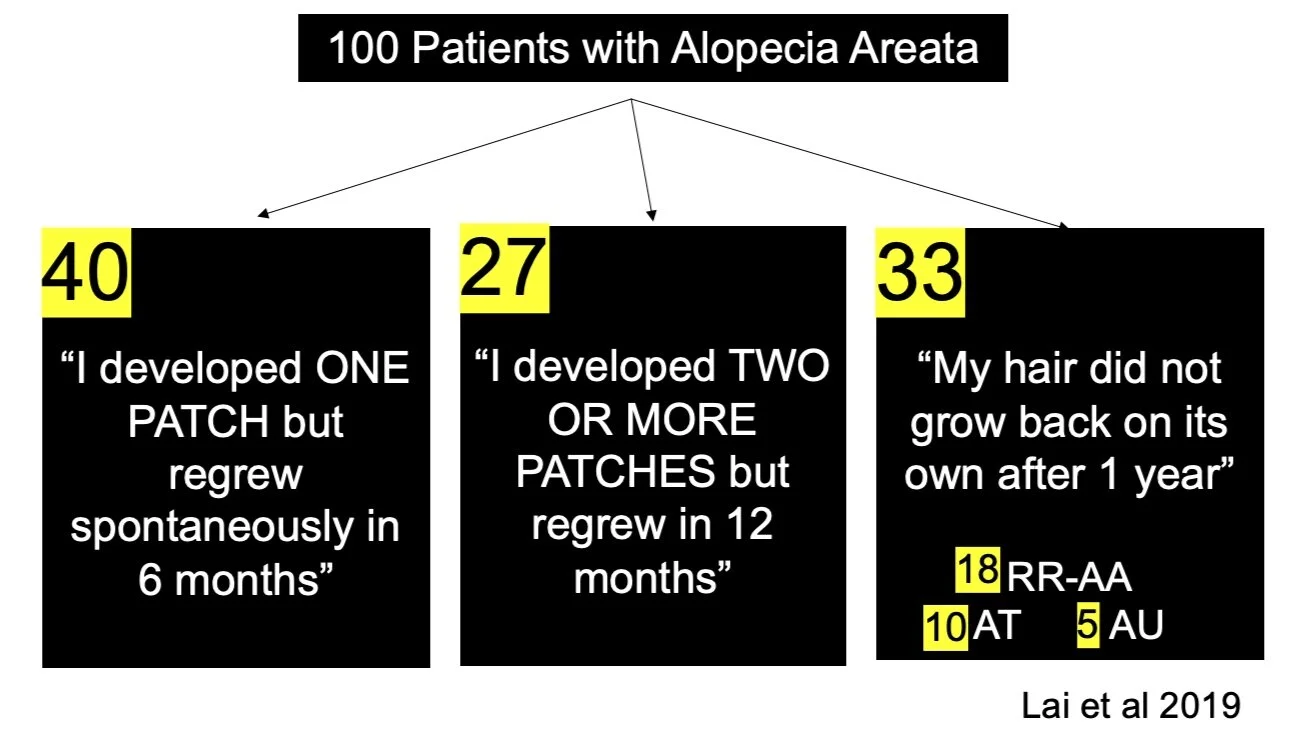Prognostic Factors for Alopecia Areata
Age of Onset, and Extent of Hair Loss are Among Most Important Prognostic Factors
Alopecia Areata is an autoimmune disease that affects about 2% of the world. About 1/3 of patients with limited alopecia will regrow hair in 6 months and about 1/3 will regrow by the end of 1 year. However, for about one third of patients, a more chronic form of alopecia areata is likely to develop. This includes 18 % of patients who will develop a relapsing remitting alopecia Areata, 10 % who will develop alopecia totalis and 5 % who will develop alopecia universalis.
Prognostic Factors for Alopecia Areata
Over the past 30 years, several factors have been found to be associated with poorer prognosis for regrowth of hair. These factors are not absolute but do enable clinicians to be able to better predict the ilkelihood of whether patients will regrow hair.
The most important prognostic factors for alopecia areata are:
1] Extensive loss (especially alopecia totalis and universalis)
2] Early age of onset (especially under 5)
3] Ophiasis variant (hair loss at the back regions of the scalp)
4] Nail changes suggestive of alopecia areata
5] History of alopecia areata in a family member
6] Presence of other autoimmune diseases in the patient (eg, atopy, Hashimoto thyroiditis)
Reference
1. Tosti A, Bellavista S, Iorizzo M. Alopecia areata: a long term follow-up study of 191 patients. J Am Acad Dermatol. 2006;55(3):438–41. Epub 2006 Jun 27.
2. Tan E, Tay YK, Goh CL, Chin Giam Y. The pattern and profile of alopecia areata in Singapore—a study of 219 Asians. Int J Dermatol. 2002;41(11):748–53.
3. De Waard-van der Spek FB, Oranje AP, De Raeymaecker DM, Peereboom-Wynia JD. Juvenile versus maturity-onset alopecia areata—a comparative retrospective clinical study. Clin Exp Dermatol. 1989;14(6):429–33.
4. Yang S, Yang J, Liu JB, Wang HY, Yang Q, Gao M, et al. The genetic epidemiology of alopecia areata in China. Br J Dermatol. 2004;151(1):16–23.
5. Goh C, Finkel M, Christos PJ, Sinha AA. Profile of 513 patients with alopecia areata: associations of disease subtypes with atopy, autoimmune disease and positive family history. J Eur Acad Dermatol Venereol. 2006;20(9):1055–60.
This article was written by Dr. Jeff Donovan, a Canadian and US board certified dermatologist specializing exclusively in hair loss.

